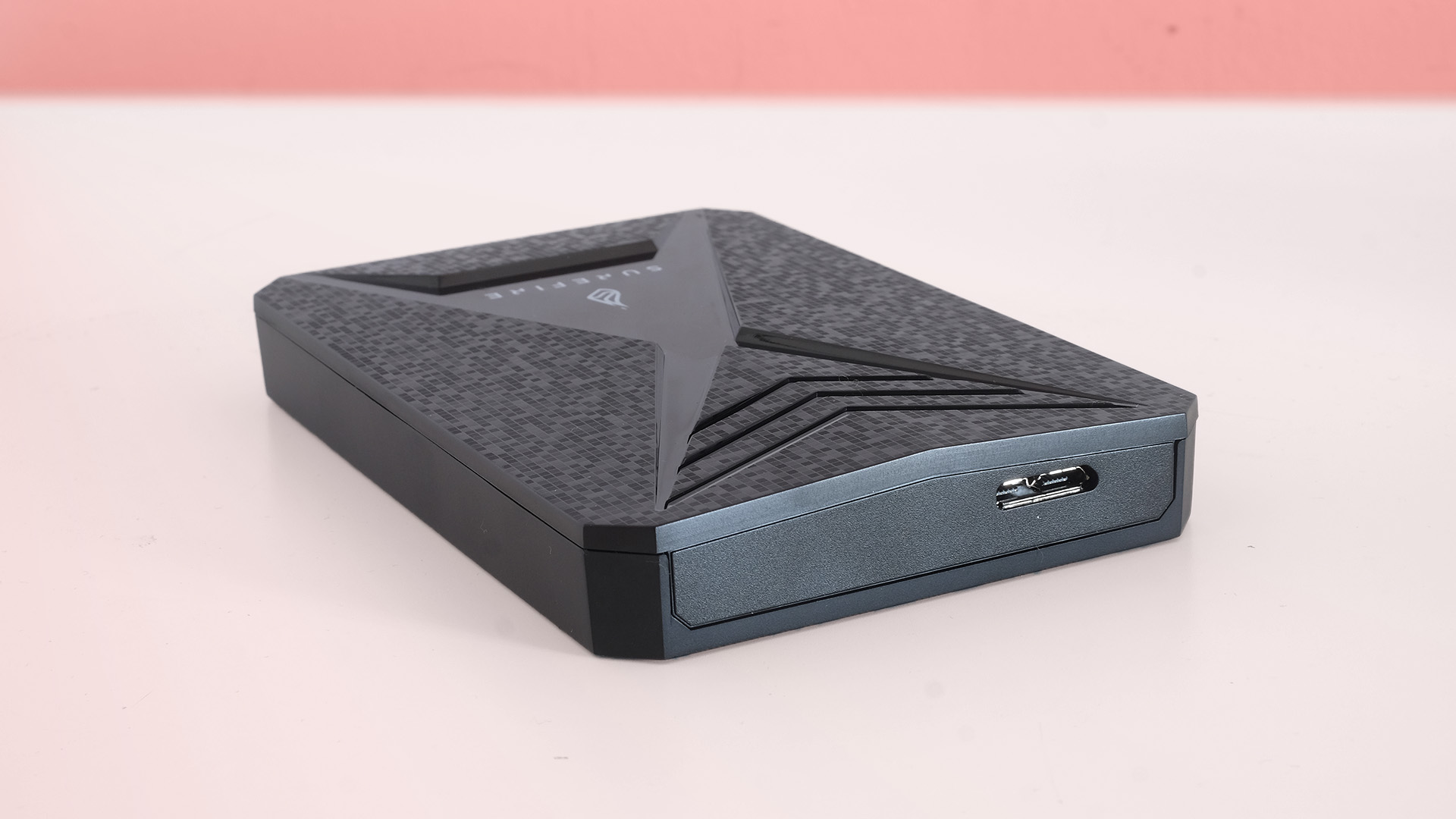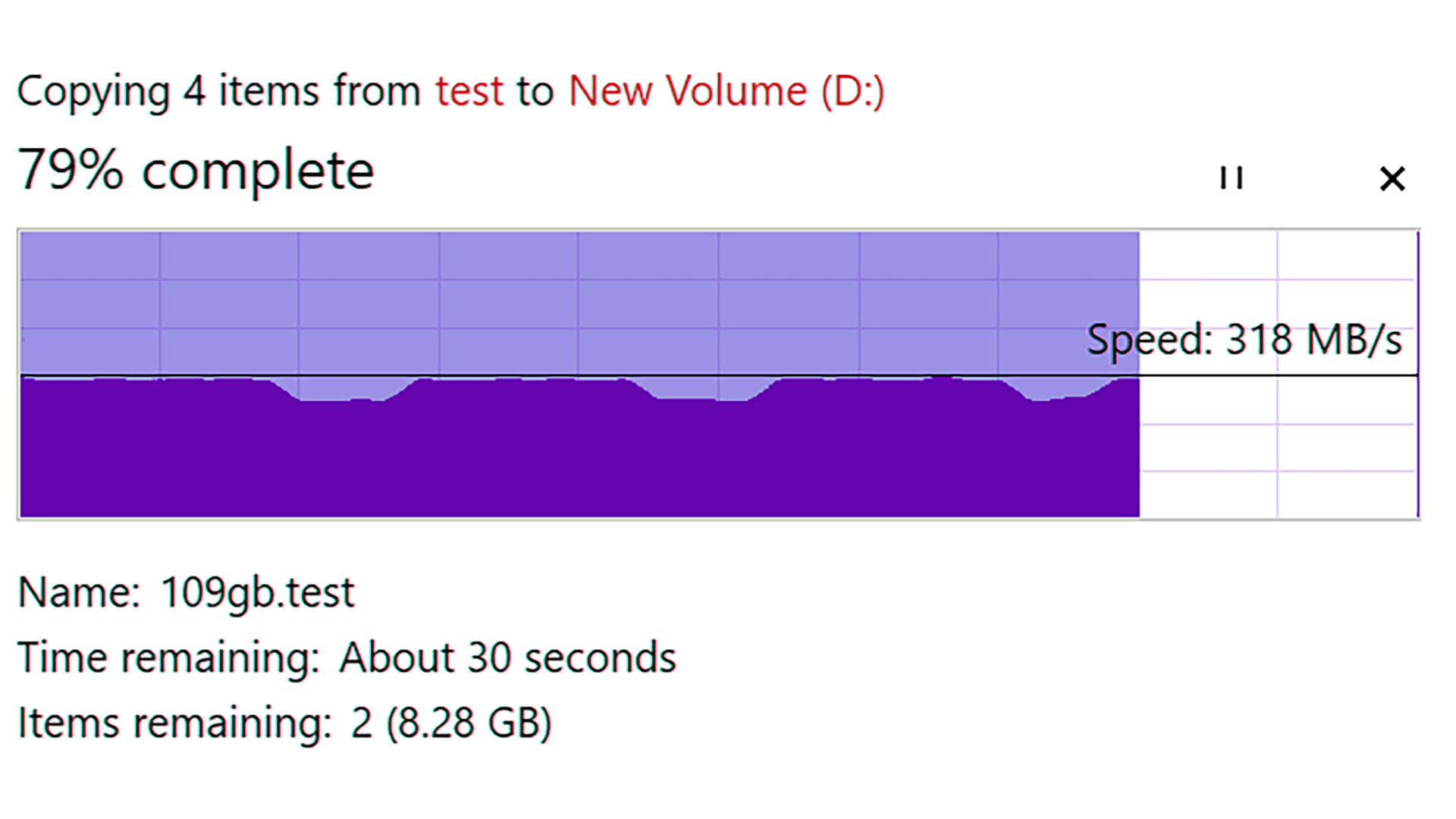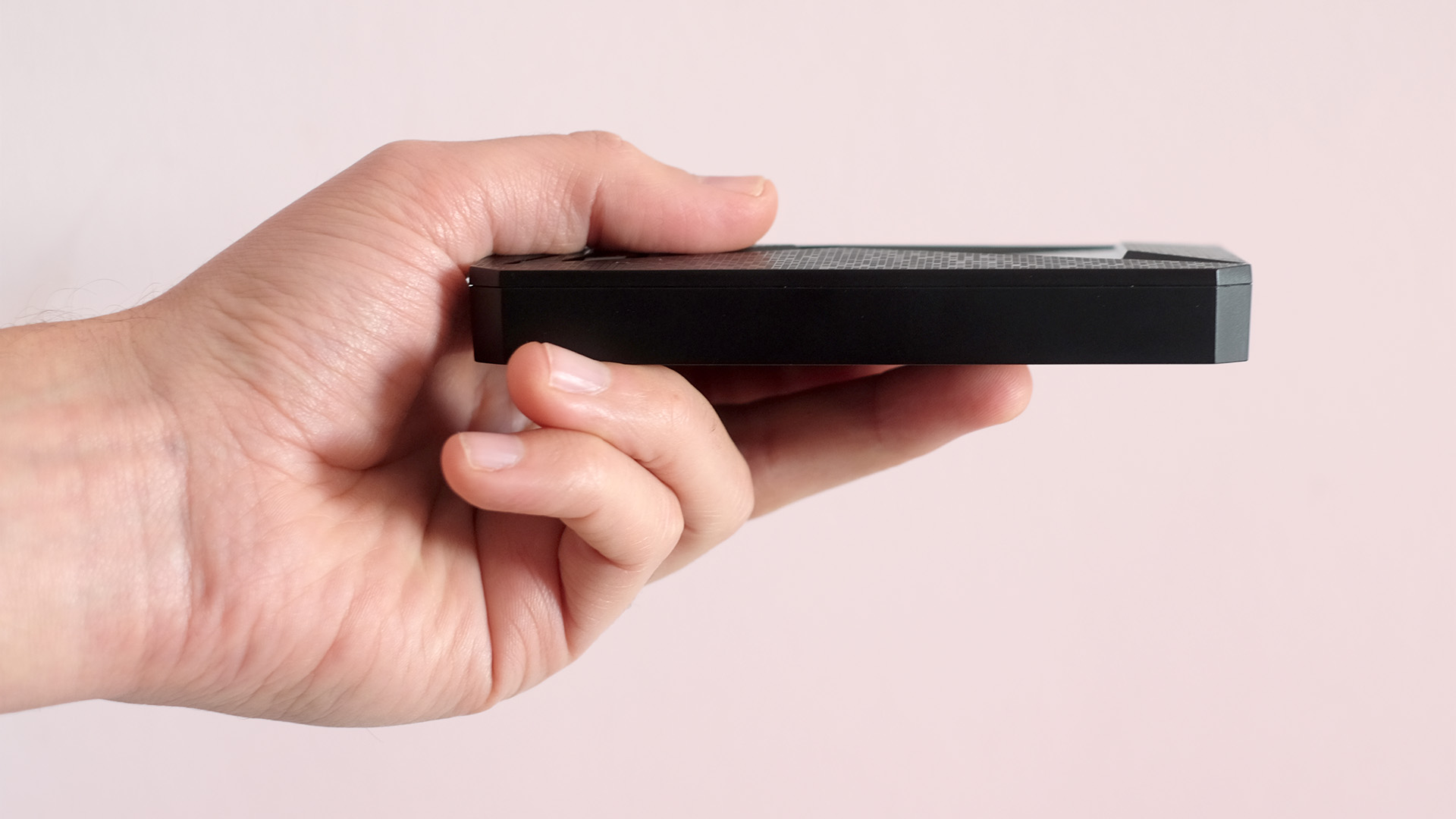SureFire GX3 Gaming SSD
The SureFure GX3 is an external SSD for gamers. You can tell just by looking at it. And while you may not have heard of SureFire before, you may know the company behind this brand. It’s Verbatim, which makes loads of storage products and has done so reliably for decades.
On paper the SureFire GX3 Gaming SSD does not sound that impressive. It’s a SATA drive, not the faster NVMe kind, and even among SATA SSDs its peak speeds don’t get close to setting any new records.
However, its performance is ultra-consistent. The SureFire GX3 Gaming SSD is perfect those who want to archive games from their Xbox Series X or PS5 without buying a new internal SSD or Seagate Expansion Card. And last-gen games run directly from this drive well.
We’d like to see the price reach a little lower, given you could buy a better-performing SATA SSD like the Crucial MX500 and a separate caddy for less. But the SureFire GX3 Gaming SSD is a good buy for those who want a zero-headache upgrade for their games console.

Price and availability
The SureFire GX3 Gaming SSD is available in the UK and Europe at the time of review, and comes in two capacities: 512GB and 1TB. We’re reviewing the “larger” version.
You need to be careful when shopping around for a deal. SureFire also makes a mechanical hard drive version also called the GX3. These are significantly cheaper, but will be nowhere near as fast.
Design
The SureFire GX3 Gaming SSD is a regular 2.5in external SATA SSD given a lick of gamer paint. Its shape and size are largely determined by the kind of SSD used here.
It’s a lot bigger than some of the ultra-portable SSDs you’ll find online, like the Samsung T5. However, SATA SSDs in this form seem to generate very little heat compared to some of the latest ultra-quick NVMe drives.
Two parts here supply the gamer flavor. First, there’s a light sparkle to the plastic casing. Look close and you’ll see the little squares that make up its pattern are etched with series of tiny lines. By altering the direction square to square, the SureFire GX3 Gaming SSD ends up looking like a tiny, moody disco ball when it catches the light.
Its actual reflectivity is minimal, mind, so it’s not going to dazzle — that’s a good thing.

That dazzling effect is saved for the RGB lighting. Three light-diffusing chevrons glow green, blue and red in sequence, mimicking the RGB nonsense of a gamer PC.
However, we think it goes a bit far when considered in the console context. These lights blink rapidly when the drive writes to the disk, which is more likely to distract than charm — opinions may vary. Sometimes we play games using a projector, and the idea of the light blinking away in the corner makes us want to put it back in the box and forget it exists. But, hey, most people don’t play using a projector.

With entire casing being made of plastic, the drive is fairly light at 104g. It uses an ageing microUSB 3.0 connector, but you get a USB-C adapter in the box as well as a microUSB-to-USB-A cable. You will lose this USB-C adapter. We already have, twice.

Performance
This SSD drive is not going to impress any of the techies out there with its peak read/write speeds. However, we think its real-world performance is a great fit for today’s latest consoles, and the Xbox Series X/S in particular. For performance PCs? Not so much.
We used CrystalDiskMark and a laptop to see if the SureFire GX3 Gaming SSD’s speeds match the company’s claims. It says you can get read speeds of up to 450MB/s, writes of 430MB/s. We saw peak reads of 451MB/s, writes of 404MB/s. Close enough.

The bottleneck here is likely the real-world transfer speeds possible over USB 3.2 Gen 1, the spec of this drive’s interface. Its theoretical maximum is 5Gbps, or 625MB/s. But you only tend to see speeds close to that from a SATA drive when you actually bung it in a PC directly.
The Xbox Series X/S USB ports use exactly the same USB interface, so the two seem perfectly matched.
Transferring Resident Evil 7’s 22GB install from the Xbox Series X to the drive took 1 minute 48 seconds. The larger Fallout 4 (55GB) took 5 minutes 48 seconds. This suggests sustained game transfer speeds of around 160-170MB/s. That may not sound all that impressive, but we need to consider game installs are like a buffet of finger food, comprised of files of all kinds of different sizes.
It’s less easy to clear away than a single wheel of cheese. We also created some giant files in Windows to see how the SureFire GX3 Gaming SSD handled those data cheese wheels. It writes data at around 318MB/s for a period, switches down to 275MB/s for a bit before shifting up again. This cycle carries around and around, resulting in satisfyingly consistent file transfer speeds.

And that is why, despite having much lower peak speeds than the WD Black D30 we tested recently, the SureFire GX3 Gaming SSD is actually much better for gaming archiving. The Fallout 4 install that took 5 minutes 58 seconds on the SureFire took 11 minutes 09 seconds in the WD D30.
Where some NVMe drives showboat with fast peak speeds that evaporate quickly under pressure, the SureFire GX3 Gaming SSD just keeps on going at more-or-less the same rate. It’s one of those tortoise and hare situations, except this tortoise is pretty fast in its own right.
Resident Evil 7 on Xbox Series X loads in 13 seconds, compared to 24 seconds when installed to an external mechanical hard drive. And a saved game load takes 10 seconds, or 34 seconds from the hard drive.
These times are so much closer to those of the Xbox’s own ultra-fast SSD than the creaky old hard drive that playing them from the SureFire GX3 Gaming SSD feels more-or-less the same. It is, in part, because the rhythm of these older games’ transitions and load screens is based around use on a hard drive.
Of course, if you are a truly demanding PC gamer rather than a console fan, you may not be satisfied with SATA speed. You could buy a faster Samsung T7 instead, or get a mid-range NVMe SSD like the WD Blue SN550 1TB and a separate enclosure, and still end up paying less.
However, at that stage that’s like saying buying a pre-built PC is silly. Many Xbox and PS5 owners just want to be able to plug a drive in, have it work well, and as expected. That’s the part the SureFire GX3 Gaming SSD nails. We just wish it had a switch to turn off those RGB lights.

Buy the SureFire GX3 Gaming SSD if...
You want a less boring external SSD
The SureFire GX3 Gaming SSD is less dull-looking than other 2.5in external SSD drives. It has a mild spangly plastic finish and a trio of light-up chevrons that glow in primary colors as you play. May be a bit much for a subdued console setup but a great fit for those with a Philips Ambilight TV or an RGB festooned gaming PC.
You're after a no-nonsense drive for console game install archiving
While the SureFire GX3 Gaming SSD’s peak read and write speeds won’t blow your mind, there’s an admirable consistency to its transfer rates that comes into play with archiving those massive game installs. It ends up outpacing some “faster” NVMe SSDs, and those progress bars fill up with at a reassuringly constant rate.
You'l use it to play last-gen games on your current-gen console
Judging by our testing with several games on Xbox Series X, game load speeds are fairly similar to those seen when games are stored on the console’s own SSD. You may have to wait a second or two here or there, but these minor delays are nothing like the drawn-out pauses seen when using a mechanical hard drive.
Don't buy the SureFire GX3 Gaming SSD if...
You're not down for a light show
We’re not fans of the SureFire GX3 Gaming SSD’s use of flashing RGB lighting when writing to disk. It’s going to be too distracting in some situations and, unlike most other forms of gaming LEDs, there’s no way to turn them off or dim the brightness.
You want a match for an ultra-fast performance PC
This would not be out first choice for those with a high-end gaming PC. While the SureFire GX3 Gaming SSD will do just fine paired with such a machine, that you can get a faster NVMe solution for less money, particularly if your have room for another internal drive, should make you pause.
You're an unrepentant techy bargain hunter
The SureFire GX3 Gaming SSD is arguably a bit expensive for a 1TB SATA SSD at its original pricing. We’d suggest shopping around to try to find it below its original price, although as our testing shows its real-world performance may beat a drive that looks faster on paper.
- Best SSDs: more storage for your gaming needs
0 comments:
Post a Comment